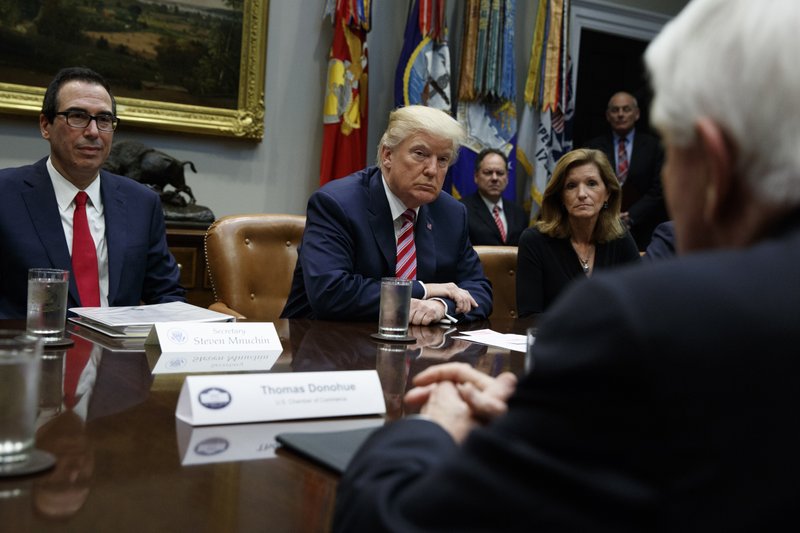WASHINGTON (AP) — President Donald Trump is considering sweeping tariffs on imports from China, with an announcement possible as early as next week. And that has industry groups and some lawmakers scrambling to prevent the next front in a potential trade war that could reverberate across the U.S. economy.
Early indications from the White House have officials braced for tariffs across a wide variety of consumer goods, from apparel to electronics, and even on imported parts for products made in the U.S. The size and scope remain under debate, but the U.S. Chamber of Commerce is warning that annual tariffs of as much as $60 billion on Chinese goods would be “devastating.”
Trump’s focus on China could be even more consequential, both at home and abroad, than the recently announced penalty tariffs on steel and aluminum. And amid the staff turmoil at the White House, it’s being read as a sign of rising influence for the administration’s populist economic aides, led by Commerce Secretary Wilbur Ross and adviser Peter Navarro.
Even Larry Kudlow — an avowed free trader tapped to replace Gary Cohn as director of the White House National Economic Council — has said that China deserves a “tough response” from the United States and its friends. He told CNBC this week, “The United States could lead a coalition of large trading partners and allies against China.”
But with these tariffs, the Trump administration appears so far to be content to go it alone.
On Friday, the National Retail Federation, which recently hosted industry groups to organize opposition to another round of tariffs, convened a conference call to update its members. “They’re all concerned about this,” said David French, vice president for government relations. “Tariffs are a tax on consumers and they’re best used sparingly as tools.”
Trade experts and economists say the tariffs could lead to rising prices for U.S. consumers and businesses without accomplishing one of the president’s stated goals: reducing last year’s trade imbalance of $566 billion.
China, the largest source of the trade imbalance, would likely respond to any tariffs by retaliating with higher import taxes on U.S. goods, among other possible restrictions.
“They signaled that they will aim at things that affect the United States politically as well as economically,” said Claude Barfield, a scholar at the conservative American Enterprise Institute and former consultant with the U.S. trade representative.
Trump’s focus on China could be even more consequential, both at home and abroad, than the recently announced penalty tariffs on steel and aluminum. And amid the staff turmoil at the White House, it’s being read as a sign of rising influence for the administration’s populist economic aides, led by Commerce Secretary Wilbur Ross and adviser Peter Navarro.
Even Larry Kudlow — an avowed free trader tapped to replace Gary Cohn as director of the White House National Economic Council — has said that China deserves a “tough response” from the United States and its friends. He told CNBC this week, “The United States could lead a coalition of large trading partners and allies against China.”
But with these tariffs, the Trump administration appears so far to be content to go it alone.
On Friday, the National Retail Federation, which recently hosted industry groups to organize opposition to another round of tariffs, convened a conference call to update its members. “They’re all concerned about this,” said David French, vice president for government relations. “Tariffs are a tax on consumers and they’re best used sparingly as tools.”
Trade experts and economists say the tariffs could lead to rising prices for U.S. consumers and businesses without accomplishing one of the president’s stated goals: reducing last year’s trade imbalance of $566 billion.
China, the largest source of the trade imbalance, would likely respond to any tariffs by retaliating with higher import taxes on U.S. goods, among other possible restrictions.
“They signaled that they will aim at things that affect the United States politically as well as economically,” said Claude Barfield, a scholar at the conservative American Enterprise Institute and former consultant with the U.S. trade representative.
AP

